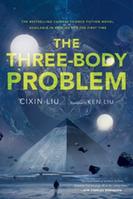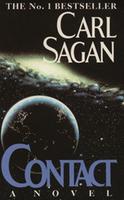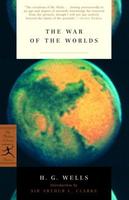 After finally reading Cixin Liu's masterful The Three-Body Problem (Tor, $17.99), I was left wondering what interests me in science fiction about first contact between alien life and our own. Naturally, there is the "aliens are cool" factor. However, I'm often drawn to fiction that is more about humanity's reaction to contact than to the aliens themselves. In The Three-Body Problem, the author refers to a fictional sociologist who proposed the theory of "contact as symbol." The theory argues "that contact with an alien civilization is only a symbol or a switch. Regardless of the content of the encounter, the results would be the same.... The impact would be magnified by the lens of human mass psychology and culture until it resulted in huge, substantive influences on the progress of civilization." I'm taken by the idea that first contact will have a profound impact on people simply because they are people.
After finally reading Cixin Liu's masterful The Three-Body Problem (Tor, $17.99), I was left wondering what interests me in science fiction about first contact between alien life and our own. Naturally, there is the "aliens are cool" factor. However, I'm often drawn to fiction that is more about humanity's reaction to contact than to the aliens themselves. In The Three-Body Problem, the author refers to a fictional sociologist who proposed the theory of "contact as symbol." The theory argues "that contact with an alien civilization is only a symbol or a switch. Regardless of the content of the encounter, the results would be the same.... The impact would be magnified by the lens of human mass psychology and culture until it resulted in huge, substantive influences on the progress of civilization." I'm taken by the idea that first contact will have a profound impact on people simply because they are people.
 Contact (Gallery Books, $16) by Carl Sagan features a similarly grounded take on first contact--at least at first. As the evidence of extraterrestrial life becomes known, the novel spends a great deal of time on humanity's often-destructive reaction to the news, ultimately resulting in a terrible act of sabotage. Sagan is interested in how people would incorporate the knowledge of alien life into their viewpoints, particularly if they are religiously-minded. In keeping with the "contact as symbol" hypothesis, even the relatively limited contact Sagan portrays has an enormous impact.
Contact (Gallery Books, $16) by Carl Sagan features a similarly grounded take on first contact--at least at first. As the evidence of extraterrestrial life becomes known, the novel spends a great deal of time on humanity's often-destructive reaction to the news, ultimately resulting in a terrible act of sabotage. Sagan is interested in how people would incorporate the knowledge of alien life into their viewpoints, particularly if they are religiously-minded. In keeping with the "contact as symbol" hypothesis, even the relatively limited contact Sagan portrays has an enormous impact.
 The idea that first contact plays on human psychology is an old one, going back at least to H.G. Wells's classic War of the Worlds (Penguin Books, $9). Apart from aliens with heat-rays, a great deal of the novel is about the psychic effect of the invasion: the confusion and terror of refugees, the effects of trauma and the onset of insanity. When the aliens are finally defeated, it is thanks to disease, not human resiliency. It might be worth heeding Stephen Hawking's advice about messages from aliens: "we should be wary of answering back." --Hank Stephenson, bookseller, Flyleaf Books, Chapel Hill, N.C.
The idea that first contact plays on human psychology is an old one, going back at least to H.G. Wells's classic War of the Worlds (Penguin Books, $9). Apart from aliens with heat-rays, a great deal of the novel is about the psychic effect of the invasion: the confusion and terror of refugees, the effects of trauma and the onset of insanity. When the aliens are finally defeated, it is thanks to disease, not human resiliency. It might be worth heeding Stephen Hawking's advice about messages from aliens: "we should be wary of answering back." --Hank Stephenson, bookseller, Flyleaf Books, Chapel Hill, N.C.

